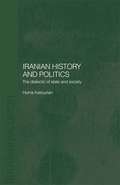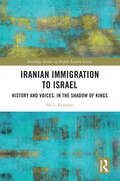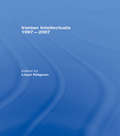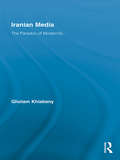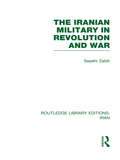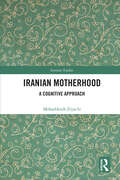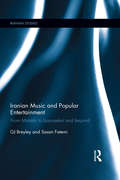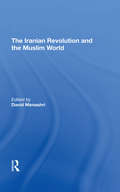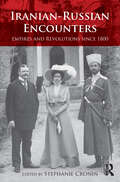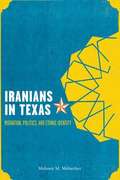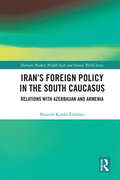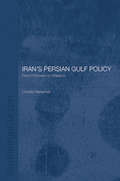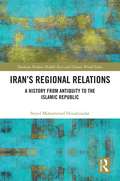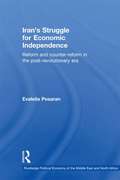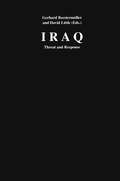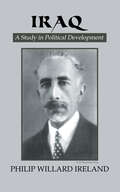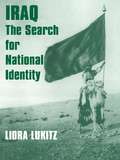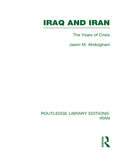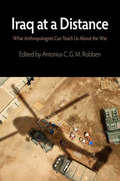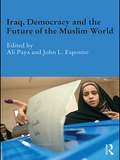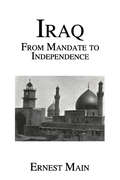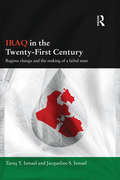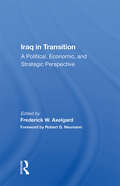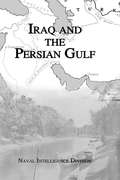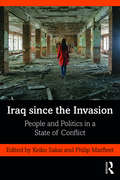- Table View
- List View
Iranian History and Politics: The Dialectic of State and Society (Routledge/BIPS Persian Studies Series)
by Homa KatouzianThis book contains the most detailed and comprehensive statement of Homa Katouzian's theory of arbitrary state and society in Iran, and its applications to Iranian history and politics, both modern and traditional. Every chapter is a study of its own specific topics while being firmly a part of the whole argument. The discussions include close comparisons with the history of Europe to demonstrate the diversities of the logic and sociology of Iranian history from their European counterparts. Being the first modern theory of Iranian history, it is highly regarded by Iranian historians and social scientists, especially as it has helped to resolve many of the anomalies resulting from the application of traditional theories.
Iranian Immigration to Israel: History and Voices, in the Shadow of Kings (Routledge Studies in Middle Eastern Society)
by Ali L. EzzatyarExploring the fascinating history behind Iranian-Jewish immigration to Israel, this book offers a rare and untold history of one of Israel’s Middle Eastern Jewish populations. Over the twentieth century, thousands among Iran’s Jewish community left their ancestral homes and immigrated to the Jewish State, while thousands remained in Iran, even after the birth of the Islamic Republic of Iran. Using first-hand narratives, the evolution of Zionist activities and recruitment in Iran over the last century is covered, alongside an Iranian-Jewish population that, unlike other Middle Eastern Jewish communities, did not ultimately arrive in the Holy Land as a majority of their community. For those that did arrive (or, make aliyah) the Israeli nation-building process had unique ramifications. The integrative process and current status of the Iranian community in Israel is also examined, providing an intimate picture of Iranian life in Israel, nearly 75 years after Israel’s establishment. A natural addition to any collection on Jewish or Israeli history, and essential reading for a full understanding of Iran-Israel relations, students of Israeli nation-building and affairs, as well as Iranian history, demographics, and politics will find this book invaluable.
Iranian Intellectuals: 1997–2007
by Lloyd RidgeonPreviously published as a special issue of British Journal of Middle East Studies, this volume focuses on leading figures within Iran between 1997-2007 and their visions and works that are related to Iranian society. A cross section of opinion is investigated, including the clerical (‘Ali Khameneh’i, Muhammad Khatami and Mohsen Kadivar), the dissident (Mohsen Makhmalbaf), and the poetic (Qaysar Aminpour) and cinematic. The past decade has been a traumatic one in Iran, and the essays in this volume testify to the vibrancy of the responses from Iranian thinkers. It may be a surprise to some observers that in some senses, ‘Ali Khameneh’i may be considered a ‘liberal’ whereas Muhammad Khatami’s own credentials as an advocate of rapprochement with the West needs to be qualified. Responses to Western culture continue to remain centre-stage, and this is also nowhere more apparent than in the complex relationship between the directors of Iranian films (perhaps Iran’s most celebrated export these days) and their audiences, both Iranian and Western. Despite some viewing Iran as a pariah state, it remains firmly connected to the West and to modern technology, typified in the practice of blogging that is enjoyed by so many Iranians, which has provided a new space for expression and thinking.
Iranian Media: The Paradox of Modernity (Routledge Advances in Internationalizing Media Studies)
by Gholam KhiabanyThe post-revolutionary state in Iran has tried to amalgamate ‘Sharia with electricity’ and modernity with what it considers as ‘Islam’. While sympathetic to private capital, through quasi anti-capitalist politics, the state began to restrict market-relations, confiscate major assets of sections of the Iranian bourgeoisie, and nationalize major aspects of Iran’s industry, including its communications system. Since the end of war with Iraq and the start of the process of ‘reconstruction’, market-driven development and economic policies have been key aims of the state.
The Iranian Military in Revolution and War (Routledge Library Editions: Iran)
by Sepehr ZabirThis book is a fascinating critical examination of the characteristics and development of the armed forces in Iran, their role under the Shah and their re-creation in the war against Iraq as the fighting forces of Islam. The author examines the contradictory accounts, including the Shah’s own Answer to History, as well as newly available accounts by highly placed ex-officials, and interviews with exiled army officers. He examines in detail the apparent shift of allegiance within the forces from the Shah to Imam and the ways in which this was accomplished. Major Iranian offensives, changing strategies from human wave assault to the Tankers War, and the delicate balance between the regular Army and the Revolutionary Guards, are also extensively examined. The book concludes with an analysis of the potential role of the armed forces in a succession crisis.
Iranian Motherhood: A Cognitive Approach (Iranian Studies)
by Mohaddeseh ZiyachiThis book characterises the problematic status of motherhood in present-day Iranian society – that is, problem in the Foucauldian sense of an object of thought and a source of tension, not as a pathological issue – and explains the historical processes contributing to this problematisation. Taking an interdisciplinary approach, the author draws on a cognitive anthropological perspective whilst incorporating ethnographic, historical, and evolutionary viewpoints. By applying this perspective to the current cultural model of motherhood, and considering specific social, political, and economic factors in Iran, the author provides an exhaustive, contextualised understanding of the motherhood problem and its multidirectional changes throughout time. The book follows a multi-method framework and combines qualitative ethnographic and auto-ethnographic data with historical evidence and comparative data. As such, it also contributes to the women's movement in Iran by fostering discussion on women's issues and demystifying women's understandings and experiences. The book will appeal to those working in a range of disciplines, including gender studies, cognitive anthropology and Iranian history. Written in non-technical language, and providing insights into the problem of motherhood in comparable contexts, the book will also be of interest to general readers.
Iranian Music and Popular Entertainment: From Motrebi to Losanjelesi and Beyond (Iranian Studies)
by Sasan Fatemi Gj BreyleyThe word motreb finds its roots in the Arabic verb taraba, meaning 'to make happy.' Originally denoting all musicians in Iran, motrebi came to be associated, pejoratively, with the cheerful vulgarity of the lowbrow entertainer. In Iranian Music and Popular Entertainment, GJ Breyley and Sasan Fatemi examine the historically overlooked motrebi milieu, with its marginalized characters, from luti to gardan koloft and mashti, as well as the tenacity of motreb who continued their careers against all odds. They then turn to losanjelesi, the most pervasive form of Iranian popular music that developed as motrebi declined, and related musical forms in Iran and its diasporic popular cultural centre, Los Angeles. For the first time in English, the book makes available musical transcriptions, analysis and lyrics that illustrate the complexities of this history. As it presents the findings of the authors' years of ethnographic work with the history's protagonists, from senior motreb to pop-rock stars, the book reveals parallels between the decline of motrebi and the rise of 'modernity.' In the twentieth century, the fate of Tehran's motrebi music was shaped by the social and urban polarization that ensued from the modern market economy, and losanjelesi would be similarly affected by transnational relations, revolution, war and migration. Through its detailed and informed examination of Iranian popular music, this study reveals much about the values and anxieties of Iranian society, and is a valuable resource for students and scholars of Iranian society and history.
The Iranian Revolution And The Muslim World
by David MenashriThis book delineates the Islamic revolution's impact mainly on the Muslim Middle East and examines the first decade of the revolution. It deals with the repercussions of the revolution in several Shi'i communities and examines Sunni polemical writings on the Shi'a and the Iranian revolution.
Iranian-Russian Encounters: Empires and Revolutions since 1800 (Iranian Studies)
by Stephanie CroninOver the past two hundred years, encounters between Iran and Russia have been both rich and complex. This book explores the myriad dimensions of the Iranian-Russian encounter during a dramatic period which saw both Iran and Russia subject to revolutionary upheavals and transformed from multinational dynastic empires typical of the nineteenth century to modernizing, authoritarian states typical of the twentieth. The collection provides a fresh perspective on traditional preoccupations of international relations: wars and diplomacy, the hostility of opposing nationalisms, the Russian imperial menace in the nineteenth century and the Soviet threat in the twentieth. Going beyond the traditional, this book examines subaltern as well as elite relations and combines a cultural, social and intellectual dimension with the political and diplomatic. In doing so the book seeks to construct a new discourse which contests the notion of an implacable enmity between Iran and Russia Bringing together leading scholars in the field, this book demonstrates extensive use of family archives, Iranian, Russian and Caucasian travelogues and memoirs, and newly available archives in both Iran and the countries of the former Soviet Union. Providing essential background to current international tensions, this book will be of particular use to students and scholars with an interest in the Middle East and Russia.
Iranians in Texas: Migration, Politics, and Ethnic Identity
by Mobasher Mohsen M.Thousands of Iranians fled their homeland when the 1978–1979 revolution ended the fifty-year reign of the Pahlavi Dynasty. Some fled to Europe and Canada, while others settled in the United States, where anti-Iranian sentiment flared as the hostage crisis unfolded. For those who chose America, Texas became the fourth-largest settlement area, ultimately proving to be a place of paradox for any Middle Easterner in exile. Iranians in Texas culls data, interviews, and participant observations in Iranian communities in Houston, Dallas, and Austin to reveal the difficult, private world of cultural pride, religious experience, marginality, culture clashes, and other aspects of the lives of these immigrants. Examining the political nature of immigration and how the originating and receiving countries shape the prospects of integration, Mohsen Mobasher incorporates his own experience as a Texas scholar born in Iran. Tracing current anti-Muslim sentiment to the Iranian hostage crisis, two decades before 9/11, he observes a radically negative shift in American public opinion that forced thousands of Iranians in the United States to suddenly be subjected to stigmatization and viewed as enemies. The book also sheds light on the transformation of the Iranian family in exile and some of the major challenges that second-generation Iranians face in their interactions with their parents. Bringing to life a unique population in the context of global politics, Iranians in Texas overturns stereotypes while echoing diverse voices.
Iran's Foreign Policy in the South Caucasus: Relations with Azerbaijan and Armenia (Durham Modern Middle East and Islamic World Series)
by Marzieh Kouhi-EsfahaniIran’s role as a regional power is more significant than many in the West may realise. The country lies between Central Asia/the Caucasus and the Gulf region on the one hand, and, on the other, between the Mediterranean/Levant region and South Asia. Many of these areas are of increasing strategic importance. This book explores Iran’s role as a regional power, focusing on relations with South Caucasus countries - Azerbaijan and Armenia. It outlines the historical context, including Persia’s rule of these countries before the nineteenth century, and discusses Iran’s approach to foreign and regional policy and how both internal and international factors shape these policies. The book assesses Iran–Azerbaijan and Iran–Armenia bilateral relations to demonstrate how those policies translate in Iran's regional and bilateral relations. The book concludes by considering how Iran's relations in the region are likely to develop in the future.
Iran's Persian Gulf Policy: From Khomeini to Khatami
by Dr Christin MarschallThis book examines the foreign policy of the Islamic Republic of Iran towards the states of the Persian Gulf from 1979 to 1998. It covers perceptions Iranians and Arabs have of each other, Islamic revolutionary ideology, the Iran/Iraq war, the Gulf crisis, the election of President Khatami and finally the role of external powers, such as the United States. The author argues that over the twenty-year period, the policy has moved from being ideological to pragmatic; and that by tracing its history, we can better anticipate its future relationship.
Iran's Regional Relations: A History from Antiquity to the Islamic Republic (Durham Modern Middle East and Islamic World Series)
by Seyed Mohammad HoushisadatFocusing on the interplay between domestic-level changes and region-wide interaction, this book provides a comprehensive analytical and theoretical survey of Iranian foreign relations in the Middle East from Antiquity until the Islamic Republic. It charts developments from the earliest regimes in Persia, including the Median kingdom and the Sassanid Empire, through rule by, amongst others, Abbasids, Mongols, Safavids and Qajars, up to the modern states of the Shah and the Islamic Republic. Throughout the author reflects on the enduring factors which have shaped Iran’s relations with the rest of the region, factors such as geography, culture, the belief systems of policy makers, the structures of decision-making and government, and sub-regional systems. Overall, the book provides a deep analysis of Iranian foreign relations in the Middle East over 4,700 years.
Iran's Struggle for Economic Independence: Reform and Counter-Reform in the Post-Revolutionary Era (Routledge Political Economy of the Middle East and North Africa)
by Evaleila PesaranIt is often assumed that Iran must necessarily submit to the forces of globalization and liberalize its economy, but the country’s ruling elites have continued throughout the post-revolutionary era to resist these pressures for neo-liberal economic reform, seeking to survive in the battlefield of today’s globalizing economy whilst remaining loyal to their own rules of engagement. This book analyzes the dynamics of economic reform in the Islamic Republic of Iran as they have played out in this post-revolutionary struggle for economic independence from 1979 up to the present day. It shows how, although some groups within the Iranian elite are in favor of opening up the economy to the inflow of foreign capital – believing that lasting independence requires economic growth powered in part by investment from abroad – others argue that such economic liberalization might endanger Iran’s national interests and put the survival of the post-revolutionary regime at risk. By examining the political causes of the ongoing tug-of-war that has taken place between these two sides of reform and counter-reform, this book provides a new approach to understanding the complex process of economic policy-making in the Islamic Republic of Iran, which will be relevant to future examinations of the political economy of the Middle East.
Iraq: Threat and Response
by Gerhard BeestermoellerThis volume of essays about the ongoing crisis concerning Iraq is written from the perspective of the "thoughtful opposition." German and American scholars from diverse backgrounds--moral theology, policy analysis, political science, Middle Eastern history--all criticize, albeit sometimes for different reasons, unilateral U.S. military action against Iraq.The chapters are uniformly free of intemperate language and careless argumentation characteristic of much opposition to American foreign policy. The authors address the moral, legal, political, or historical dimensions of the Iraq problem. They also assess the threat Saddam Hussein represents to his region and the world as well as the prospects for alternative strategies. The reasoning is well-informed, sensitive to complexity, and attentive to detail.Contributions include: Klaus Dicke, "Peace Through International Law and the Case of Iraq"; Hans J. Giessmann, "The Dubious Legitimacy of Preventive Military Action against Iraq"; John Langan, "Is Attacking Iraq a Good Idea?" and "Is There a Just Cause for War against Iraq?"; Gerhard Beestermller, "The United States: Legitimate Authority for War against Iraq?"; Drew Christiansen, "Holy See Policy towards Iraq"; Henner Frtig, "Iraq: How Severe is the Threat?"; and David Cortright, Alistair Millar, and George A. Lopez, "Sanctions, Inspections and Containment. Viable Policy Options in Iraq."While Iraq: Threat and Response may not be welcomed by uncritical supporters of U.S. policy, it is a reasoned, compassionate exploration of alternatives to military action in Iraq. The volume is clearly designed to strengthen opposition to unilateral action in the United States and abroad. It will be of great interest to students of foreign policy, military studies, and the Middle East.Gerhard Beestermller is deputy director of the Catholic Institute for Theology and Peace, near Hamburg. His focus of research is political ethics and peace ethics. David Little is T.J. Dermot Dunphy Professor of the Practice in Religion, Ethnicity, and International Conflict and director of Initiatives in Religion and Public Life at Harvard Divinity School. He is the author, with Scott W. Hibbard, of Islamic Activism and U.S. Foreign Policy.
Iraq
by IrelandFirst published in 2005. Routledge is an imprint of Taylor & Francis, an informa company.
Iraq: The Search for National Identity
by Liora LukitzThe 1990-1991 crisis in the Middle East and the disturbances that followed, threw the deep-seated divisions within the Iraqi population into focus. This book examines the complexities of the internal cultural, political and religious conflict within the modern state of Iraq.
Iraq and Iran: The Years Of Crisis (Routledge Library Editions: Iran)
by Jasim M AbdulghaniBehind the Iran-Iraq war rests a history of conflict stretching back to the Ottoman Turks and the Persians. This book examines the deep-seated and complex factors involved in the rivalry between these two nations. It focuses particularly on the period between 1969 and 1984, a time that saw both the rise of the Ba’th party in Iraq and Khomeini’s return to power in Iran. These changes did much to escalate tensions. The Ba’th party’s ideological, socialist regime and its emphasis on political secular concerns stood in marked contrast to Iran under Khomeini and his efforts to spread an Islamic revolution among the nation’s Shiite majority. The author discusses how these differences have affected three long-term problems: Iraq’s and Iran’s rivalry for dominance in the Arabian Gulf region; disputes over the Shatt al-Arab waterway, which serves as a boundary between the two nations; and the Kurdish rebellion in Iraq, supported by Iran. The volume also looks at the most recent episodes of crisis and analyzes the evolution of the Iran-Iraq war and its implications both regionally and globally. Unlike other studies of Iraq’s relations with Iran, Abdulghani’s is distinguished by its systematic and comprehensive synthesis which interlocks legal, cultural, historical and political issues that have characterized relations between the two countries.
Iraq at a Distance
by Antonius C. G. M. RobbenThe Iraq War has cost innumerable lives, caused vast material destruction, and inflicted suffering on millions of people. Iraq at a Distance: What Anthropology Can Teach Us About the War focuses on the plight of the Iraqi people, caught since 2003 in the carnage between U.S. and British troops on one side and, on the other, Iraqi insurgents, militias, and foreign al Qaeda operatives.The volume is a bold attempt by six distinguished anthropologists to study a war zone too dangerous for fieldwork. They break new ground by using their ethnographic imagination as a research tool to analyze the Iraq War through insightful comparisons with previous and current armed conflicts in Cambodia, Israel, Palestine, Northern Ireland, Afghanistan, and Argentina. This innovative approach extends the book's relevance beyond a critical understanding of the devastating war in Iraq. More and more parts of the world of long-standing ethnographic interest are becoming off-limits to researchers because of the war on terror. This book serves as a model for the study of other inaccessible regions, and it shows that the impossibility of conducting ethnographic fieldwork does not condemn anthropologists to silence.Essays analyze the good-versus-evil framework of the war on terror, the deterioration of women's rights in Iraq under fundamentalist coercion, the ethnic-religious partitioning of Baghdad through the building of security walls, the excessive use of force against Iraqi civilians by U.S. counterinsurgency units, and the loss of popular support for U.S. and British forces in Iraq and Afghanistan after the brutal regimes of the Taliban and Saddam Hussein had been toppled.
Iraq, Democracy and the Future of the Muslim World (Durham Modern Middle East and Islamic World Series)
by Ali PayaIraq, democracy and Islam are powerful global forces which shape not only many aspects of the lives of Muslims, but the lives of other citizens of the world as well. This book explores many of the challenging questions posed by the interconnections between these three forces, concentrating on issues which have global significance and which have been less studied up until now. It contains contributions from many of the leading thinkers and academics from this subject area, including the former President of Iran, Seyyed Mohammad Khatami. Topics such as the compatibility of Islam and democracy, and the question of whether democracy can be encouraged in the Middle East are looked at carefully. Contributors evaluate the circumstances under which democracy can be imposed by outside force, and asks what forces are driving the confrontation between the West and Islam, before looking at how this confrontation is likely to develop. This book presents a comprehensive picture of dynamic change in the geopolitics of our time, and offers a timely contribution to research on Middle East Politics and Islamic Studies.
Iraq From Manadate Independence
by Ernest MainFirst published in 2008. Routledge is an imprint of Taylor & Francis, an informa company.
Iraq in the Twenty-First Century: Regime Change and the Making of a Failed State (Durham Modern Middle East and Islamic World Series)
by Tareq Y. Ismael Jacqueline S. IsmaelMuch has been written about the events surrounding the 2003 Anglo-American invasion of Iraq and its aftermath, especially about the intentions, principles, plans and course of action of US policy, but much less attention has been given to the consequences of US policy on Iraqi political and social development. This book provides an in-depth analysis of the impact of US policy on the social and political development of Iraq in the twenty-first century. It shows how not just the institutions of the state were destroyed in 2003, leaving the way open for sectarianism, but also the country’s cultural integrity, political coherence, and national-oriented economy. It outlines how Iraq has been economically impoverished, assessing the appalling situation which ordinary people, including women and children, have endured, not just as a result of the 2003 war, but also as a consequence of the 1991 war and the sanctions imposed in the following years. The book argues that the social, political, and cultural ruin that accompanied the Iraq war was an absolute catastrophe; that the policies which had such adverse effects were the foreseeable consequences of deliberate policy choices; and that those responsible continue to evade being made accountable.
Iraq In Transition: A Political, Economic, And Strategic Perspective
by Frederick W AxelgardAfter twenty-five years of thinly veiled hostility, U.S. relations with post-monarchial Iraq have warmed dramatically. Simultaneously, Iraq's sovereignty has become the keystone of Gulf stability, due to Iraq's military and economic resilience and to the rise of Khomeini's Iran and the waning of Saudi influence. In this book, five leading analysts
Iraq & The Persian Gulf
by Naval Intelligence DivisionFirst Published in 2005. Routledge is an imprint of Taylor & Francis, an informa company.
Iraq since the Invasion: People and Politics in a State of Conflict
by Keiko SakaiThis book addresses the complex events and unexpected outcomes of military intervention by the United States and its allies in Iraq in 2003. Considering the long-term outcomes of the intervention, this volume examines economic collapse, societal disorder, and increased regional conflict in Iraq. The book assesses the means by which American strategists imposed a new political order, generalising corruption, sectarian preference, and ethnic cleansing, and stimulating mass population movements in and from Iraq. Mobilising a multidisciplinary perspective, the book explores the rise and fall of Iraq’s confessional leaders, the emergence of a popular movement for reform, and the demands of young radicals focused upon revolutionary change. The product of years of intensive research by Iraqis and international scholars, Iraq since the Invasion considers how an initiative designed to produce “regime change” favourable to the United States and its allies brought unprecedented influence for Iran—both in Iraq and the wider Gulf region. It analyses events in Kurdistan and the impacts of change on relations between Iraq and its neighbours. The book includes a wealth of detail on political, social, and cultural change, and on the experiences of Iraqis during long years of upheaval. It will be of value to researchers and students interested in international relations, development studies, and Middle East politics.
